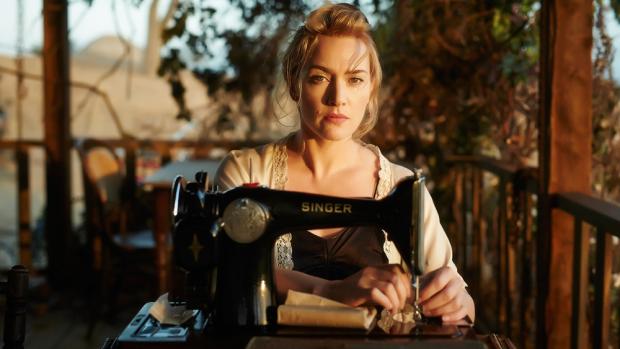The Dressmaker
“I’m back, you bastards!” Tilly Dunnage (Kate Winslet) emphatically declaims to no one in particular as she steps from a train in an Australian outback village in Jocelyn Moorhouse’s The Dressmaker. Actually, there’s no one around to hear her save for the village police sergeant (Hugo Weaving), who asks the most obvious question: “Is that Dior?” He’s enthralled by her ultra-chic getup. (It isn’t Christian Dior, as it happens.) This hick cop is only semi-secretly in love with fabric, fashion and fabulousness.
At the beginning, and here and there, The Dressmaker seems to be channeling a combination of Frederick Durrenmatt’s female-vengeance play The Visit and the drag queen movie The Adventures of Priscilla, Queen of the Desert (in which Weaving appeared many years ago). Before long, there are even brief hints of a Sergio Leone movie, especially when David Hirshfelder’s score sounds clanging spaghetti-western chords. This movie is assertively strange and tonally inconsistent.
It’s the early 1950s, and Tilly has returned to her hometown after years of exile as the suspected murderer of a schoolboy. She can’t remember what happened then and her soused, ridiculous, rancorously reprobate mother (Judy Davis) can’t, or won’t, help her remember.
Soon, Tilly is running up strikingly designed outfits for snobbish, fashion-starved local ladies, using the skills she learned from Parisian couture. She’s also attracting the attention of a local socially marginal hunk and a half (Liam Hemsworth). So much is stuffed into this movie (adapted from Rosalie Ham’s novel) by Moorhouse and her husband P. J. Hogan, director of Muriel’s Wedding) that you can lose track of Tilly’s mission, and when the secret she’s seeking is revealed—along with one she hadn’t reckoned on—it’s rather anti-climactic. It doesn’t help that the movie is so tonally unstable. It moves in fits and starts through broad-beamed humor to sentimental banality and on to gonzo gothicism. It even takes a thrust or two at personal tragedy. Sometimes Moorehouse seems to be trying to convey a mocking, almost campy sense, and at others, it seems possible she’s taking things seriously.
Davis has much the best lines and she pitches herself into this caricatural role with an astute gusto, but she’s eventually defeated by The Dressmaker’s wild inconsistency. At one point, Tilly confronts a maliciously untruthful witness to the boy’s death while playing a recording of Rodgers and Hammerstein’s “Carousel,” and I have no idea why.
The Dressmaker has to be seen to be believed but please, oh please, don’t take that as a recommendation. My conscience is guilty enough. If you go, you’re on your own.

